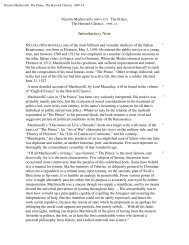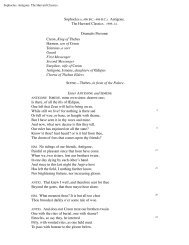Notre Dame de Paris - Bartleby.com
Notre Dame de Paris - Bartleby.com
Notre Dame de Paris - Bartleby.com
Create successful ePaper yourself
Turn your PDF publications into a flip-book with our unique Google optimized e-Paper software.
Book VI<br />
I. An Impartial Glance at the Ancient Magistracy<br />
A MIGHTY fortunate personage in the year of grace 1482, was the noble knight, Robert d’Estouteville,<br />
Sieur of Beyne, Baron of Ivry and Saint-Andry in the March, Councillor and Chamberlain to the King,<br />
and War<strong>de</strong>n of the Provostry of <strong>Paris</strong>. It was well-nigh seventeen years ago since he had received from<br />
the King, on November 7, 1465—the year of the <strong>com</strong>et 60—this fine appointment of Provost of <strong>Paris</strong>,<br />
reputed rather a seigneurie than an office. Dignitas, says Joannes Lœmnœus, quæ, cum non exigua<br />
potestate politiam concernente, atque prærogativis multis et juribus conjuncta est. 61 It was in<strong>de</strong>ed a<br />
thing to marvel at that in 1482 a gentleman should be holding the King’s <strong>com</strong>mission, whose letters of<br />
appointment dated back to the date of the marriage of a natural daughter of Louis XI with Monsieur the<br />
Bastard of Bourbon. On the same day on which Robert d’Estouteville had replaced Jacques <strong>de</strong> Villiers in<br />
the Provostry of <strong>Paris</strong>, Maître Jehan Dauvet superse<strong>de</strong>d Messire Hélye <strong>de</strong> Thorrettes as Chief Presi<strong>de</strong>nt<br />
of the Court of Parliament, Jehan Jouvenel <strong>de</strong>s Ursins supplanted Pierre <strong>de</strong> Morvilliers in the office of<br />
Chancellor of France, and Regnault <strong>de</strong>s Dormans turned Pierre Puy out of the post of Master of Common<br />
Pleas to the royal palace. But over how many heads had that Presi<strong>de</strong>ncy, that Chancellorship, and that<br />
Mastership passed since Robert d’Estouteville held the Provostship of <strong>Paris</strong>! It had been “given unto his<br />
keeping,” said the letters patent; and well in<strong>de</strong>ed had he kept the same. He had clung to it, incorporated<br />
himself into it, had so i<strong>de</strong>ntified himself with it that he had managed to escape that mania for change<br />
which so possessed Louis XI, a close-fisted, scheming king, who sought to maintain, by frequent<br />
appointments and dismissals, the elasticity of his power. Furthermore, the worthy knight had procured<br />
the reversion of his post for his son, and for two years now the name of the noble M. Jacques<br />
d’Estouteville, Knight, had figured besi<strong>de</strong> that of his father at the head of the roll of the Provostry of<br />
<strong>Paris</strong>—in truth, a rare and signal favour! To be sure, Robert d’Estouteville was a good soldier, had<br />
loyally raised his banner for the King against the “League of the Public Weal,” and on the entry of the<br />
Queen into <strong>Paris</strong> in 14—had presented her with a won<strong>de</strong>rful stag <strong>com</strong>posed of confectionery. Besi<strong>de</strong>s<br />
this, he was on a very friendly footing with Messire Tristan l’Hermite, Provost-Marshal of the King’s<br />
palace. So Messire Robert’s existence was an easy and pleasant one. First of all, he enjoyed very good<br />
pay, to which were attached and hanging like extra grapes on his vine, the revenues from the civil and<br />
criminal registries of the Provostry, the revenues, civil and criminal, accruing from the auditory courts of<br />
the Châtelet, not to speak of many a <strong>com</strong>fortable little toll-due from the bridges of Mantes and Corbeil,<br />
and the profits from the taxes levied on the grain-<strong>de</strong>alers, as on the measurers of wood and salt. Add to<br />
this, the pleasure of displaying on his official ri<strong>de</strong>s through the city—in shining contrast to the<br />
party-coloured gowns, half red, half tan, of the sheriffs and district officers—his fine military<br />
accoutrements, which you may admire to this day, sculptured on his tomb in the Valmont Abbey in<br />
Normandy, and his morion with all the bruises in it got at Montlhæry. Then, it was no mean thing to have<br />
authority over the constables of the Palais <strong>de</strong> Justice, over the war<strong>de</strong>r and the Commandant of the<br />
Châtelet, the two auditors of the Châtelet (auditores Castelleti), the sixteen <strong>com</strong>missioners of the sixteen<br />
districts, the jailer of the Châtelet, the four enfeoffed officers of the peace, the hundred and twenty<br />
mounted officers of the peace, the hundred and twenty officers of the rod, the captain of the watch with<br />
his patrol, his un<strong>de</strong>r-patrol, his counter-and-night-patrol. Was it nothing to exercise supreme and<br />
secondary jurisdiction, to have the right of pillory, hanging, and dragging at the cart’s tail, besi<strong>de</strong>s minor<br />
jurisdiction in the first resort (in prima instantia, as the old charters have it) over the whole vis<strong>com</strong>ty of










